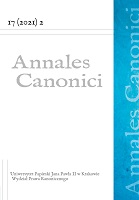Wykorzystanie akt sprawy małżeńskiej w kanonicznym postępowaniu karnym
The use of acts of the matrimonial nullity propcess into the canonical penal proceedings
Author(s): Aleksandra Brzemia-Bonarek, Jan DohnalikSubject(s): Studies in violence and power, Family and social welfare, Canon Law / Church Law, Penal Policy
Published by: Wydawnictwo Naukowe Uniwersytetu Papieskiego Jana Pawła II w Krakowie
Keywords: confidentiality; secrecy of office; penal canonical proceedings; matrimonial nullity process; passing juridical documents;
Summary/Abstract: The article answers a question asked recently by practitioners: is it allowed to pass acts from canonical marriage process to canonical penal process in cases of sexual abuse of minors and vulnerable by some clergy? Church law regarding reporting crimes and passing documents to penal processes has significantly developed in recent years. The interpretations of art. 3–4 and 19 of motu proprio of Pope Francis Vos estis lux Mundi (VELM) and art. 4 of rescriptum that repeals papal secret in certain penal matters (Instruction On the Confidentiality of Legal Proceedings) it can be established that official secrecy is not violated either by reporting the case to the competent civil authorities, as the investigating agency or court nor to the appropriate authority of the Church. Since chancellery secrecy does not constitute an obstacle to the transfer of documents from Church proceedings to state authorities, it is even more justified to allow passing the documents through internal structures of the judicial dimension of the Church. Undefining the scope of the concept of “official secrecy” when trying to discern whether the transfer of documents between canonical processes: matrimonial and criminal is permitted, one should resolve according to the general principles of canon 19 of the Code of Canon Law. Worth point out is the widely known and accepted, even in situations where the identity of persons is lacking, the practice of transferring the documents of the marriage process between marriage tribunals yet this issue has no stipulation in general law. The analysis of the canonical processes: marriage and criminal, allowed the authors to adopt a position in favor of disclosing files to a judge conducting a criminal trial against a clergyman accused of violating the VI Commandment against minors and vulnerable, which, however, must be preceded by a careful analysis of the legitimacy of such request. To respect the right to the intimacy of the persons to whom the information concerns and the legitimate public interest in the resolution of a criminal tribunal, the judge can make a copy of a part of the document (can.1546 § 2 of the Code of Canon Law).
Journal: Annales Canonici
- Issue Year: 17/2021
- Issue No: 2
- Page Range: 7-32
- Page Count: 26
- Language: Polish

